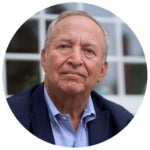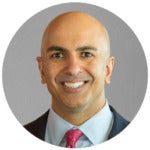In Collaboration with the Aspen Economic Strategy Group
Featuring Laurence D. Fink, BlackRock Chairman and CEO; President and CEO of the Federal Reserve Bank of Minneapolis Neel Kashkari; Aspen Economic Strategy Group Director Melissa Kearney; and former US Secretary of the Treasury and Harvard University President Emeritus Lawrence H. Summers; in conversation with chief economics commentator and deputy economics editor for The Wall Street Journal Greg Ip. Persistent supply shocks and geopolitics point to continued upward pressure on inflation. Meanwhile, the pressure on real incomes from rising prices and the Fed’s tightening of monetary policy pose risks to growth. In the longer-term, population aging, declining fertility, and a costly and difficult green energy transition all point to lower long-term potential growth (stagnation). This raises the risk of stagflation, an economic dynamic not seen since the 1970s. How great are the risks of stagflation?
Laurence D. Fink is Chairman and Chief Executive Officer of BlackRock. He and seven partners founded BlackRock in 1988, and under his leadership, the firm has grown into a global leader in investment and technology solutions. BlackRock’s mission is to help investors build better financial futures and the firm is trusted to manage more money than any other investment company in the world. Mr. Fink has been named one of the “World’s Greatest Leaders” by Fortune, and Barron’s has named him one of the “World’s Best CEOs” for 15 consecutive years. Prior to founding BlackRock in 1988, Mr. Fink was a member of the Management Committee and a Managing Director of The First Boston Corporation. He serves as a member of the Board of Trustees of New York University (NYU) and the World Economic Forum, and is Co-Chairman of the NYU Langone Medical Center Board of Trustees. In addition, he serves on the boards of the Museum of Modern Art, the Council on Foreign Relations and the International Rescue Committee. He also serves on the Advisory Board of the Tsinghua University School of Economics and Management in Beijing and on the Executive Committee of the Partnership for New York City. Mr. Fink earned an MBA with a concentration in real estate from the University of California at Los Angeles (UCLA) in 1976 and a BA in political science from UCLA in 1974.
Neel Kashkari has been president and chief executive officer of the Federal Reserve Bank of Minneapolis since Jan. 1, 2016. He serves as a member on the Federal Open Market Committee, bringing the Ninth Federal Reserve District’s perspective to monetary policy discussions in Washington, D.C. In addition to those responsibilities, Neel oversees Minneapolis Fed operations and leads its many initiatives. Among them, he was instrumental in establishing the Opportunity & Inclusive Growth Institute, whose mission is to ensure that world-class research helps to improve the economic well-being of all Americans. Most recently, he has joined with retired Minnesota Supreme Court Justice Alan Page to propose amending Minnesota’s constitution to make quality public education a fundamental right. This effort supports the Fed’s mandate to achieve maximum employment, with education being a key to obtaining a good job. Under Neel’s leadership, the Minneapolis Fed also released an action plan on “Ending Too Big to Fail,” which calls for tighter bank regulations to avoid future taxpayer bailouts of large financial institutions. Neel earned his bachelor’s and master’s degrees in mechanical engineering from the University of Illinois. He became an aerospace engineer, developing technology for NASA missions. Eventually turning to finance and public policy, he earned his MBA from the University of Pennsylvania’s Wharton School, joined Goldman Sachs, and served in several senior positions at the U.S. Department of the Treasury, including overseeing the Troubled Asset Relief Program, or TARP, during the financial crisis. Before joining the Minneapolis Fed, he ran for governor of California in 2014 on a platform focused on economic opportunity. He lives with his wife, Christine, children, Uly and Tecumseh, and Newfoundland dog Webster in Orono, Minn.

Melissa S. Kearney is the Neil Moskowitz Professor of Economics at the University of Maryland. She is also director of the Aspen Economic Strategy Group; a research associate at the National Bureau of Economic Research; and a nonresident senior fellow at the Brookings Institution. She serves on the Board of Directors of MDRC and on advisory boards for the Notre Dame Wilson-Sheehan Lab for Economic Opportunities and the Smith Richardson Foundation. Kearney previously served as Director of the Hamilton Project at Brookings and as co-chair of the Massachusetts Institute of Technology J-PAL State and Local Innovation Initiative. Kearney’s research focuses on poverty, inequality, and social policy in the United States. Her work is published in leading academic journals and is frequently cited in the press. She is an editorial board member of the American Economic Journal: Economic Policy, Journal of Economic Literature, and Demography; she was previously co-editor of the Journal of Human Resources and a Senior Editor of the Future of Children. Kearney teaches Public Economics at both the undergraduate and Ph.D. level at the University of Maryland. She holds a B.A. in Economics from Princeton University and a Ph.D. in Economics from MIT.
 Lawrence H. Summers is the Charles W. Eliot University Professor and President Emeritus of Harvard University. During the past two decades, he has served in a series of senior policy positions in Washington, D.C., including the 71st Secretary of the Treasury for President Clinton, Director of the National Economic Council for President Obama and Vice President of Development Economics and Chief Economist of the World Bank. He received a bachelor of science degree from the Massachusetts Institute of Technology in 1975 and was awarded a Ph.D. from Harvard in 1982. In 1983, he became one of the youngest individuals in recent history to be named as a tenured member of the Harvard University faculty. In 1987, Mr. Summers became the first social scientist ever to receive the annual Alan T. Waterman Award of the National Science Foundation (NSF), and in 1993 he was awarded the John Bates Clark Medal, given every two years to the outstanding American economist under the age of 40. He is currently the Charles W. Eliot University Professor at Harvard University and the Weil Director of the Mossavar-Rahmani Center for Business & Government at Harvard’s Kennedy School. He and his wife Elisa New, a professor of English at Harvard, reside in Brookline and have six children.
Lawrence H. Summers is the Charles W. Eliot University Professor and President Emeritus of Harvard University. During the past two decades, he has served in a series of senior policy positions in Washington, D.C., including the 71st Secretary of the Treasury for President Clinton, Director of the National Economic Council for President Obama and Vice President of Development Economics and Chief Economist of the World Bank. He received a bachelor of science degree from the Massachusetts Institute of Technology in 1975 and was awarded a Ph.D. from Harvard in 1982. In 1983, he became one of the youngest individuals in recent history to be named as a tenured member of the Harvard University faculty. In 1987, Mr. Summers became the first social scientist ever to receive the annual Alan T. Waterman Award of the National Science Foundation (NSF), and in 1993 he was awarded the John Bates Clark Medal, given every two years to the outstanding American economist under the age of 40. He is currently the Charles W. Eliot University Professor at Harvard University and the Weil Director of the Mossavar-Rahmani Center for Business & Government at Harvard’s Kennedy School. He and his wife Elisa New, a professor of English at Harvard, reside in Brookline and have six children.




